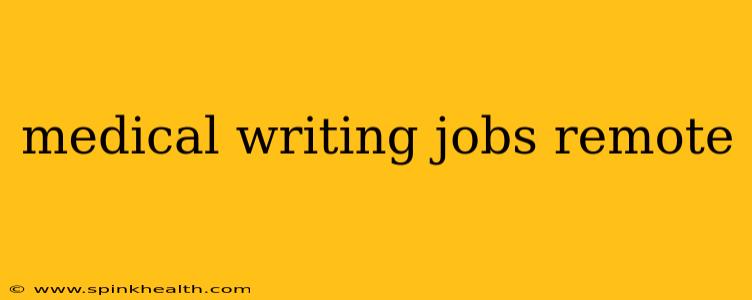The world of medical writing offers a unique blend of intellectual stimulation and the power to positively impact healthcare. And what's even better? Many medical writing roles are now fully remote, opening up a world of possibilities for freelance writers seeking flexibility and location independence. But navigating this exciting landscape can feel like charting uncharted waters. This guide will help you chart your course to success, sharing the secrets to landing your dream remote medical writing job.
My name is Alex, and I've spent the last five years building my career as a remote medical writer. I've seen the highs and lows, the triumphs and the challenges. This journey wasn't always easy, but the rewards—both professional and personal—have been immense. Let's embark on this adventure together.
What Exactly is Medical Writing?
Before diving into the job hunt, it’s essential to fully grasp the scope of medical writing. It's far more than just doctor's notes. Medical writers create a diverse range of content, including:
- Regulatory documents: These are crucial for getting new drugs and medical devices approved. Think clinical study reports, investigator brochures, and submissions to regulatory agencies like the FDA.
- Medical publications: This involves crafting manuscripts for peer-reviewed journals, presenting research findings clearly and concisely.
- Marketing materials: This ranges from brochures and websites to presentations for healthcare professionals. Accuracy and adherence to regulatory guidelines are paramount here.
- Medical education materials: These might include training manuals, patient education leaflets, and continuing medical education (CME) materials.
The breadth of work is significant, and it's this variety that makes the field so compelling.
How to Find Remote Medical Writing Jobs?
The internet is your oyster! Here are some avenues to explore:
- Freelance platforms: Sites like Upwork and Freelancer.com often have medical writing gigs listed. However, be prepared for competition. Building a strong profile and showcasing impressive samples is key.
- Job boards: Sites specializing in remote work, such as FlexJobs and We Work Remotely, frequently post medical writing opportunities. These often focus on higher-paying, long-term positions.
- Networking: This is often overlooked, but incredibly powerful. Attend online medical writing conferences, join relevant LinkedIn groups, and engage with professionals in the field. A simple conversation can lead to unexpected opportunities.
- Direct applications: Identify pharmaceutical companies, medical device companies, and contract research organizations (CROs) that interest you. Check their websites for open positions or even send unsolicited applications showcasing your skills and experience.
What Skills Do I Need for Remote Medical Writing Jobs?
Beyond excellent writing skills, several other attributes are crucial:
- Scientific knowledge: A strong understanding of medical terminology, research methodologies, and regulatory requirements is essential. A science background (e.g., biology, chemistry, pharmacy) is highly beneficial.
- Exceptional writing skills: Clarity, conciseness, and accuracy are paramount. You need to be able to convey complex information simply and effectively.
- Attention to detail: Medical writing demands meticulous accuracy. A single error can have serious consequences.
- Time management skills: As a freelancer, you’ll need to be highly organized and able to meet tight deadlines.
What are the common challenges faced by remote medical writers?
This is a realistic look at the challenges:
Finding and securing clients: Competition can be fierce. Building a strong portfolio and actively networking are crucial for success.
Managing time and workload: Staying organized and prioritizing tasks is essential to avoid burnout. Setting realistic deadlines and using project management tools can be very helpful.
Maintaining work-life balance: The lines between work and personal life can blur when working remotely. Setting boundaries and sticking to a schedule is key to preventing burnout.
Dealing with difficult clients: Not all clients are created equal. Learning how to navigate difficult situations and set clear expectations is crucial for long-term success.
How much can I earn as a remote medical writer?
This varies significantly depending on experience, niche, and client. Entry-level writers might earn $30-$50 per hour, while experienced writers can command $75-$150 or more.
What are the benefits of working as a remote medical writer?
The perks extend beyond the financial:
- Flexibility: Set your own hours and work from anywhere.
- Work-life balance: More control over your schedule leads to better work-life integration.
- Intellectual stimulation: Working on diverse projects keeps the work engaging.
- Impactful work: Your writing helps advance healthcare.
Conclusion: Embark on Your Journey
The path to becoming a successful remote medical writer requires dedication, skill, and a proactive approach. But the rewards are significant—both personally and professionally. Remember to continually learn, network effectively, and showcase your expertise. With perseverance and a passion for medical writing, your dream remote career awaits. Now go out there and make it happen!

